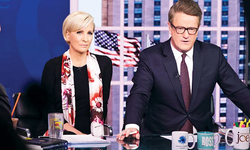The bill gives TikTok's Chinese owner ByteDance nine months to sell its shares.
US President Joe Biden has said he will sign the legislation immediately.
ByteDance did not immediately respond to this move. The company has previously said it would oppose any attempt to force TikTok to sell.
If the US allows ByteDance to sell TikTok, Chinese authorities would have to approve the deal. Beijing has said it will oppose this. Experts say the process could take at least two years.
The TikTok bill was passed as part of a package of four bills that include US military assistance for Ukraine, Israel, Taiwan and other partners in the Indo-Pacific region.
Why does the US want to ban TikTok?
There is concern that the Chinese government could force ByteDance to hand over data on TikTok's 170 million US users.
"For years we allowed the Chinese Communist Party to control one of the most popular apps in America, an attitude that was dangerously short-sighted," said Senator Marco Rubio, the ranking Republican on the Intelligence Committee. The new law will require the Chinese owner to sell the app. This is a good move for America."
TikTok insists it will not give foreign user data to the Chinese government. It says ByteDance is "not an agent of China or any other country."
ByteDance emphasizes that it is not a Chinese company and that 60% of its shares are owned by global investment companies.
When can the ban be implemented?
Even after Biden signs the bill, the ban will not take effect immediately.
In fact, since ByteDance is suing to block the forced sale, possibly going all the way to the Supreme Court, it could take several years before the practice closes to Americans.
Moreover, the legislation gives ByteDance nine months to sell TikTok to an American buyer, with a three-month grace period before any ban takes effect.
This means that the deadline for the sale is likely to be in 2025, after the newly elected US president takes office. If Donald Trump, the Republican candidate for the presidential election, wins, he may try to block the ban from being implemented.
Although Trump tried to ban the app when he was in the White House in 2020, he has criticized the new legislation, arguing that limiting TikTok would unfairly benefit Facebook.
How could the ban be implemented?
The US could ban TikTok by removing it from the app stores operated by Apple and Google for iOS and Android devices.
This would prevent new users from getting TikTok.
Those who already have the app would no longer be able to receive updates to improve security or fix bugs.
The US bill would ban apps controlled by countries hostile to the US from being updated and maintained in the US.
It gives the president broad powers to limit apps linked to Russia, China, Iran and North Korea.
How did TikTok react to the law?
TikTok criticized the law, calling it an affront to the US right to free speech.
Chief Executive Officer Shou Zi Chew warned that the bill would give "more power to a handful of other social media companies" and put the jobs of thousands of Americans at risk.
ByteDance would have to seek approval from Chinese authorities to sell TikTok, but Beijing has promised to oppose it.
The social media company, which opposes the bill, said in a statement last week that TikTok is "a platform that contributes $24 billion a year to the US economy" and that an attempt to shut it down would "trample on the freedom of expression of 170 million Americans and negatively impact seven million businesses."
The company's CEO Shou Zi Chew said last month that the company will continue to do everything it can to protect the platform, including exercising its "legal rights".
How have US users reacted?
Some US creators and users have also criticized the proposed ban.
Tiffany Yu, a young disability advocate from Los Angeles, said at a protest outside the White House that the platform was important to her work.
TikTok asked its 170 million US users to contact their political representatives and not support the bill.
But calls from TikTok users to congressmen and senators may have backfired.
Some politicians have said that the campaign has further heightened their concerns about the app and strengthened their resolve to pass the legislation.














